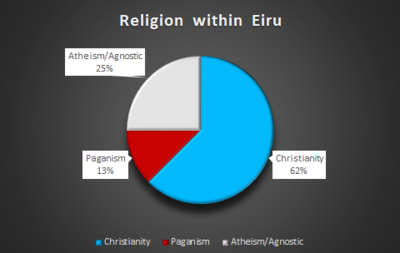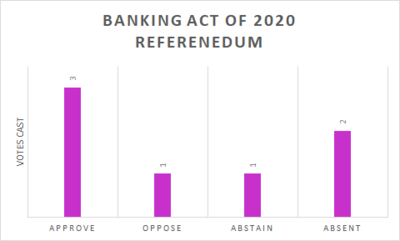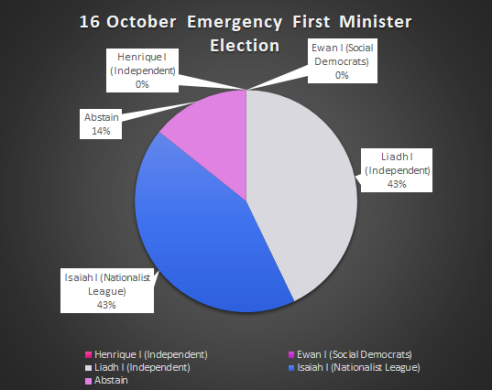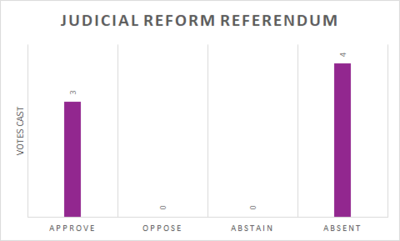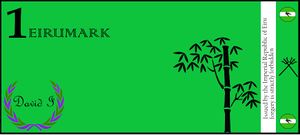Imperial Republic of Eiru
Imperial Republic of Eiru | |
|---|---|
|
Flag | |
| Motto: Valour is Superior to Numbers | |
| Anthem: Foggy Dew | |
 | |
| File:Dublin Ireland | |
| Capital | Capitillia |
| Largest city | Tobac |
| Official languages | English, Portuguese |
| Demonym(s) | Eiruan |
| Government | Imperial Republic |
• Emperor | Emperor David I |
• First Minister | Isaiah I |
| Legislature | Senate |
| The Imperial Noble House | |
| The Council of the Senate | |
| Establishment | 14 May 2020 |
| Population | |
• Census | 11 |
| Currency | Eirumark (EUM) |
| Time zone | GMT+0 |
The Imperial Republic of Eiru, "ee-roo", is a Micro-Nation created by David I and Liadh I on 12 May 2020. It is situated in the North-East of Dublin City and is landlocked by the Republic of Ireland. While created on the 12th of May it did not formally declare it's independence until two days later, the 14 May 2020. It boasts equality and justice for all of it's citizens and allows feline beings to be full citizens of the nation, even celebrating a national holiday for cats, known as "Cat Day" on 30 June and having districts of the Nation that are only to be frequented by feline citizens. The Imperial Republic has a permanent population of 7 and an area of 126 metres sq. The Constitution of The Imperial Republic of Eiru can be read here: Constitution of the Imperial Republic of Eiru. The newly reformed Lawbook of the Imperial Republic of Eiru can be read here: Eiruan Lawbook. You can apply for citizenship here: Imperial Republic of Eiru Citizenship Application Form
History
The Imperial Republic of Eiru has had a turbulent political history since it's establishment. The Imperial Republic's history can be split into three different sections, The Early Republican, Anarchal and Imperial periods.
The Early Republic
Since 2014 David I had seen many micronations thrive, such as The Republic of Molossia, Sealand and The Grand Duchy of Westarctica. Like the leaders of these pioneering nations David I dreamed of creating his own great nation, he then met Liadh I, and they both began work on creating The Imperial Republic of Eiru, although then it was known as "The Republic of Eiru". The original plan was to have a Roman-style Senate, with senators that would meet once a week, and a position of Consul that would alternate between senators every two weeks so as to dissuade abuse of power and corruption. With the idea and rough plan laid out for the form of government David I and Liadh I could then begin work on the Constitution and Laws of the "Republic of Eiru" and a declaration of independence to present to the Irish Government. With all of these necessary components in place, independence was declared on 14 May 2020. After this the first senate meeting was held between David I and Liadh I. There were complications in the political process between the two senators caused by their opposing ideologies and thus the senate never met again and the Early Republic descended into anarchy.
The Anarchal Period
The Early Republic only lasted for two weeks as it was laid on shaky foundations, the only two senators had radically opposing ideologies which meant the political process of passing legislation etc. was a tiring and not a fruitful ordeal. Thus after the First senate meeting on 14 May 2020, the senate never congregated again. After this, the Early Republic descended into anarchy, with no constitution being upheld and no government the newborn micronation was at threat of falling apart. This period could be comparable to the dark ages in Medieval Europe, nothing was achieved and no advancements were made. A great power vacuum had developed and David I seized this opportunity. He annexed the provinces of Eiru Minor and Eiru Major and began building up the Military, now known as The Imperial Guard Legion. With this strong military, he seized power and crowned himself Emperor David I, with Liadh I the Imperial Republic's First Minister. And so the Anarchal period had ended.
The Imperial Period
With David I now the Emperor of a Republic changes had to be made. He declared the "Republic of Eiru" the Imperial Republic of Eiru. He introduced sweeping reforms and changed the constitution. With all this in place the new Imperial Republic and it's new constitution came into effect on 13 September 2020 at 0700 hours (GMT+0). Districts were created for specific purposes in the Imperial Republic's territories and nature reserves were developed. A project to establish a currency for the Imperial Republic also began.
Culture
Symbolism
| Name | Picture | Summary |
|---|---|---|
| New Flag of the Imperial Republic |

|
The new Imperial Flag was designed by Emperor David I after it was clear that the First Imperial Flag was too ornately designed and had too many elements. the First Imperial Flag, detailed below, will now be used as a ceremonial flag. The New Imperial Flag has a dark green background, symbolizing Irish and Celtic Heritage. The white bands flanked by two purple bands symbolizes prosperity and the Empire's form of government which is an Imperial Republic as purple as a colour signifies royalty / imperium. The wreath is also a subtle representation of the Imperial Republican government. The Lady Harp was originally the Shield of the Kingdom of Ireland and also signifies Irish heritage. |
| First Flag of the Imperial Republic |

|
The First Imperial Flag boasts military strength and strong leadership. The green background symbolizes fertility and wealth. The white band crossing the sea of green symbolizes prosperity. In the middle of the Imperial Flag you can see a wreath, symbolizing the Empire's form of government which is an Imperial Republic, and inside the wreath is the mix of the two founders, David I and Liadh I's family crests, otherwise known as the Imperial Coat of Arms. The Imperial Coat of Arms is flanked by two tridents symbolizing the government, constitution and law's strength within the Empire. Finally on the two ends of the flag we have two Dara Knots, symbolizing Irish and Celtic heritage. |
| Imperial Coat of Arms | 
|
The Imperial Coat of Arms of the Imperial Republic of Eiru is the mix of the two founders, David I and Liadh I's family coat of arms, otherwise known as the Imperial Coat of Arms. It was created in May 2020, shortly before the Imperial Republic declared independence. |
Religion
| Religion | Popularity |
|---|---|
| Christianity | 62% Was once the most popular religion within the Imperial Republic and Emperor David I personally advocates for Christianity |
| Atheism / Agnostic | 25% Very popular form of religion within Eiru |
| Paganism | 13% Least popular religion within the Imperial Republic and former First Minister, Liadh I's official religion |
Culture / Race
| Culture / Race | % of Population |
|---|---|
| Irish race / culture | 46% The majority of Eiruan citizens classify as Irish |
| Feline Race | 27% A small proportion of Eiruan citizens classify as members of the Feline Race |
| American race / culture | 9% Few Eiruan citizens classify as this |
| Brazilian race / culture | 9% Few Eiruan citizens classify as this |
| Slovák race / culture | 9% Few Eiruan citizens classify as this |
National Holidays
| Date | Name |
|---|---|
| 1 January | New Years Day |
| 20 January | Emperor's Birthday |
| 8 March | International Women’s Day |
| 24 April | 1916 Easter Rising Remembrance Day |
| 14 May | Eiruan Independence Day |
| 30 June | Cat Day |
| 31 October | Halloween |
| 1 November | Hemming's Day |
| 21 November | Bloody Sunday Remembrance Day |
| 3 December | Terrence Day |
| 24 December | Christmas Eve |
| 25 December | Christmas Day |
Government & Foreign Relations
The Government of this Micro-Nation is comprised of an Emperor, a First Minister and a Senate. All citizens are encouraged to apply to be senators and be involved in national politics, no citizen's application can be rejected. The senate meets each week to discuss national affairs and reforms etc. Constitution of the Republic can be read here:
Government Roles
- The Emperor oversees everything that happens politically, but the main focuses of the Emperor are foreign relations, internal politics, maintaining the law and constitution and the management of the Imperial Guard Legion. The Emperor must also approve legislation put forth by the First Minister from the Senate and can block any legislation, motion or reformative action put forward on any grounds he / she sees fit, and can introduce reforms without political retardants.
- The First Minister tends to more domestic affairs such as economics, justice, culture and religion. The First Minister is also responsible for control of the Senate. When a motion by a Senator is met by approval from a majority of the Senate it is referred to the First Minister, who will check the legality of the motion in accordance to the law. If a motion is legal it can be referred to the Emperor for approval or denial. The First Minister also tends to votes of "Tyranny".
| Position | Role |
|---|---|
| Emperor | To issue Imperial Decrees, veto or pass legislation put forward by First Minister and/or Senate. |
| First Minister | To pass or veto legislation put forward by the Senate, if the First Minister passes proposed legislation he / she must refer it to the Emperor to pass / veto, handle Votes of Tyranny. |
| Senate | To put forward legislation, propose votes of tyranny. |
Senate
The Senate is the vital lifeline of the Republic, without the Senate there is no democracy. The Senate is comprised of citizens of the Imperial Republic that meet each week to discuss national issues, matters of importance, internal and external policies and changes/reforms to the Constitution. When a motion, bill and or reform is put forward by a Senator the rest of the Senate will vote either favorably or unfavorably toward the motion. If the majority of the Senate votes unfavorably the motion is dismissed. If the motion is met with approval from the Senate the motion, bill and or reform is referred to the First Minister and then the Emperor who will then make the ultimate decision, based on the legality of the new motion in accordance to the Constitution. The Emperor will also make the ultimate decision on tie votes within the Senate. The Senate meets once a week, at each meeting the final action of the Senate is to decide what day to meet the next week as the days are not fixed, to allow fluidity around National, Religious or Social holidays etc. All citizens are encouraged and obliged to be members of the Senate and contribute to the functioning democracy of the Republic. Here is a very simple table representing the Political process within the Imperial Republic.
Votes of Tyranny
If the Emperor enacts a reform to the law / constitution that is deemed unconstitutional or tyrannical the First Minister or the Senate can debate and vote on the validity of the claim. If it is popular opinion that an Imperial enacted reform to the law / constitution is unconstitutional or tyrannical then the First Minister will report this issue to the Emperor. The Emperor will then present his reasoning for his / her judgement to the First Minister and Senate to justify its validity and or ability to benefit the Imperial Republic as a whole. After this the First Minister and Senate will take another vote to pass or deny the new reform put forward by the Emperor.
Senate and Government Members
| Position | Holder | Ideology |
|---|---|---|
| Emperor | David I | Fascism |
| First Minister | Isaiah I | Nationalism |
| Senators | Ewan I, Aileen I, Caden I, Henrique I, Liadh I | Mixed |
Foreign relations
The Imperial Republic has also developed political relations in it's brief history. The Foreign Policy of the Imperial Republic is quite simple, any nations that meet the below requirements can be recognised by The Imperial Republic and Diplomatic ventures may begin if it is in both nations best interests.
- The nation must be at least six months old, effective from the date of establishment.
- The nation must have serious claims, and at least 50% of the land shall be able to be visited.
- The nation must have a stable population (more than 5) and the information regarding the population shall be true.
- The nation must not be imaginary or indulged into imaginary activities.
- The nation must have a micro-wiki, website or some kind of online presence upon which more information about the nation may be obtained.
| Name | Flag | Relations Commenced | Status of Relations |
|---|---|---|---|
| People's Republic of Adonia |  |
October 23, 2020 | Formal |
| Republic of Scoria |  |
October 7, 2020 | Formal |
| Grand Kingdom of Matachewan |  |
October 6, 2020 | Formal |
| Principality of Talaustein |  |
October 5, 2020 | Formal |
| Unified Royal States of Australis |  |
May 15, 2020 | Informal |
| Empire of Lysimachia |  |
May 14, 2020 | Informal |
| Union of Jutar |  |
May 14, 2020 | Informal |
| Kingdom of Atiera |  |
October 5, 2020 | Cancelled by David I |
Elections & political parties
Political Parties
| Party | Logo | Party Leader/Members | Ideology |
|---|---|---|---|
| Eiruan Union of Fascists | David I, Caden I | Fascism | |
| The Social Democratic Party of Eiru | Ewan I | Social Democracy | |
| Nationalist League of Eiru | N/A | Isaiah I, David II | Conservatism, Nationalism |
| Social Liberal Party |  |
Henrique I | Liberalism |
| Independents | N/A | Liadh I, Aileen I | Mixed |
Senate Seats by Party
Banking Act of 2020 Referendum
Upon review of the economic situation within the nation Emperor David I believed that creating a new act to be added to the constitution, would swiftly dissolve the confusion and disarray within the economic sector. The Banking Act of 2020, written by Emperor David I & First Minister Isaiah I, identifies what the national currency shall be based on, how that system will work, restructuring of the National Eiruan Bank and more. The new act, written on 22 October 2020 was then finalised and put to referendum with the Eiruan electorate on 23 October 2020 to see if it should be added to the constitution. The results of the 23 October 2020 Banking Act refernedum can be seen below:
The Banking Act of 2020 can be read here: The Banking Act of 2020
Emergency First Minister Election 16 October
The 17 October 2020 General Election decided who would take the position of First Minister. It commenced and ended on 16 October 2020 and marked the first Emergency Election within the Imperial Republic of Eiru. The results can be seen below.
October 2020 General Election
The October 2020 General Election decided who would take the position of First Minister. It commenced and ended on 5 October 2020 and marked the first General Election within the Imperial Republic of Eiru. The results can be seen below.
Liadh I was appointed First Minister by Emperor David I back in August, and in this General Election achieved her first democratically appointed position.
Judicial Reform Referendum, September 2020
On 28 September 2020 Emperor David I was reviewing the constitution and realized that the Eiruan legal system was in disarray, illegal actions would go unpunished and thus the Empire and it's democratic process were at risk. Thus David I wrote up a new set of laws, and the punishments for breaking such laws. The new reforms put forth by David I were put to all government members for a vote. The result of the vote can be seen in the table below:
The newly reformed Lawbook of the Imperial Republic of Eiru can be read here: Eiruan Lawbook
List of Imperial Decrees
- 28 September 2020, Emperor David I issued an Imperial Decree revoking the ban on political parties.
- 11 October 2020, Emperor David I issued an Imperial Decree ratifying the Mission for the Cupertino Alliance and the Charter of the Cupertino Alliance
- 16 October 2020, Emperor David I issues an Imperial Decree implementing an emergency election for the First Minister position.
Economy, Trade & Currency
Economy
The economy of the Imperial Republic is still quite primitive, while it sports its own currency there is not much that it can buy. Most of the economy is based around the purchase of land. Upon purchasing land the patron will develop the area into a commercial area, where other citizens can purchase their goods etc. Much of the economy is also based around loans, a citizen will take out a loan from The National Eiruan bank to buy land, produce a commercial area, obtain currency from commerce, then reimburse their loan to the Bank with interest. The wealthiest establishments and people in the Imperial Republic are as follows:
- The National Eiruan Bank
- Emperor David I
- Senator, Liadh I & Lord Aileen I
Trade
The Imperial Republic does not yet involve itself in trade between other micro-nations. However, Emperor David I is currently working on producing tradable goods and establishing relations with other micro-nations and produce trade agreements from the relations.
Currency
The Imperial Republic of Eiru's official currency is the Eirumark. The Eirumark is established on the amount of Copper the government and the National Eiruan Bank posses. For every one gram of Copper in the Government or the N.E.B's possession, there can be 5 Eirumarks produced. Copper can be found in abundance in Capitoline and Eiru Minor, yet the process of extracting it to be held in The National Bank is very difficult, thus at present, there is only 3 grams of copper in the National Bank and 15 Eirumarks in circulation nationally. The exchange rate from Eirumarks to Euro is very low, as the Eirumark is based on copper, 1.00 grams of copper is worth 0.005 Euros. And seeing as 1 gram of copper is worth 5 Eirumarks. Then 1 Eirumark is worth 0.001 Euros. Below is a picture of the Eirumark.
Territory, Map & Weather
Weather within the Imperial Republic
| Climate data for Eiru | |||||||||||||
|---|---|---|---|---|---|---|---|---|---|---|---|---|---|
| Month | Jan | Feb | Mar | Apr | May | Jun | Jul | Aug | Sep | Oct | Nov | Dec | Year |
| Average high °C (°F) | 7.9 (46.2) |
7.9 (46.2) |
9.8 (49.6) |
12.0 (53.6) |
14.8 (58.6) |
17.7 (63.9) |
19.4 (66.9) |
19.2 (66.6) |
17.2 (63) |
14.2 (57.6) |
10.2 (50.4) |
8.7 (47.7) |
19.4 (66.9) |
| Average low °C (°F) | 2.5 (36.5) |
2.4 (36.3) |
3.1 (37.6) |
4.4 (39.9) |
6.7 (44.1) |
9.4 (48.9) |
11.3 (52.3) |
11.1 (52) |
9.6 (49.3) |
7.5 (45.5) |
4.3 (39.7) |
3.2 (37.8) |
2.5 (36.5) |
| Average Precipitation mm (inches) | 70 (2.76) |
52 (2.05) |
53 (2.09) |
50 (1.97) |
60 (2.36) |
55 (2.17) |
53 (2.09) |
71 (2.8) |
75 (2.95) |
76 (2.99) |
72 (2.83) |
80 (3.15) |
Dublin climate/rainfall |
| Source: Dublin climate/rainfall | |||||||||||||
The Imperial Republic of Eiru currently occupies 126m² and contains 3 provinces, Capitoline, Eiru Minor and Eiru Major. Capitoline was the sole territory of the Imperial Republic before the annexation of Eiru Minor and Eiru Major on the 6th of August 2020. Scroll down to see detailed maps of each province. Below is a map of The Imperial Republic of Eiru with a map key. There is also a interactive map available at this link: Interactive Map of Eiru

Province of Capitoline
Capitoline is the Imperial Republic's furthest West province and is home to the Capital city, Capitilia and also the Nation's second Nature reserve, The Eiruan Eco-Park. The Eiruan Eco-Park is host to many indigenous faunas from Eiru Minor and Eiru Major such as Woodlice, Common ants, Beetles and Earwigs. The Emperor's residence and gallery are also situated in this province along with the departments of Defence, Economics, Culture, Foreign Affairs and the meeting place of the Senate located in the Capital city along with a district in which only feline citizens can reside.. See map below for further details (left) and the Provincial flag of Capitoline (right).
Province of Eiru Minor
Eiru Minor contains the Imperial Republic's town of Tobac, which has undergone much construction and electrification since the establishment of the Republic and is the Industrial heartland of the nation. Eiru Minor is also home to the Department of Agriculture and Ecology, The Imperial Gardens, the Emperor's Summer residence and the Imperial Republic's industrial district. See map below for further details (left) and the Provincial flag of Eiru Minor (right).
Province of Eiru Major
Eiru Major is home to the Imperial Republic's newest town, Memoria, it also houses the nation's first Nature reserve, Memorian Garden, which is home to many plants such as varied wild grass, ferns, buxus and other hedging plants and wild plants. The nations greatest landmark, Eiruan Bamboo is also situated in Eiru Major and is a great attraction for many of the citizens. Storage facilities for agricultural purposes are also located in this province. See map below for further details (left) and the Provincial flag of Eiru Major (right).
Military (Imperial Guard Legion)
The Imperial Guard Legion boasts military strength and the capability of defending itself against attack. It's military has many weapons in its arsenal, including war-cats, swords, tomahawks, firearms, IED's (Improvised explosive devices) and blunt force weapons. This growth in military strength was enacted by David I and is known as "The Great Muster". All citizens are required to embark on military expeditions and conquests appointed by David I and to defend the nation against foreign invasion.
Applying for Citizenship
You can apply for citizenship here: Imperial Republic of Eiru Citizenship Application Form We encourage all people that read this (and your cat if you own one) to apply for citizenship, you must email us at therepublicofEiru@gmail.com, outline your reasons for wanting to join, eg. fun, senate meetings, political beliefs etc. Also your name, age and current place of residence, eg. Alex Bonaparte, 46, Lyon, France.

